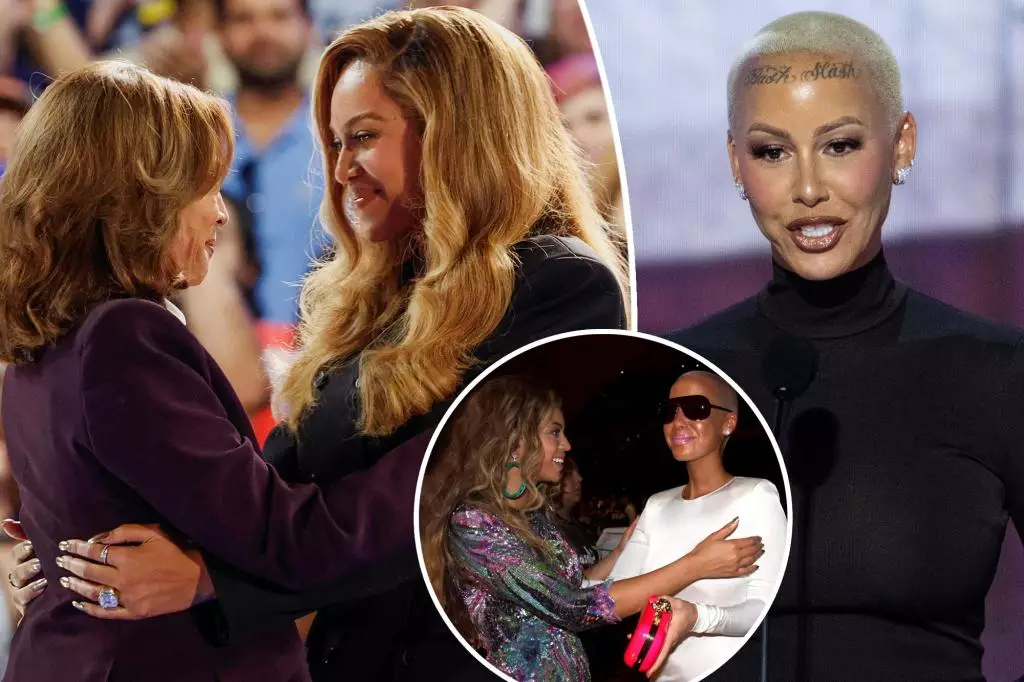In today’s hyper-connected world, where social media dominates our interactions, public figures often find themselves under scrutiny for their remarks and actions. A striking example of this phenomenon unfolded recently when Amber Rose sparked a heated conversation surrounding her comments about Beyoncé. While at first glance, it may seem like just another celebrity spat, this incident reveals much about the intricacies of fame, perception, and the power of social media narratives. The situation highlights how a single comment can spiral into a global topic of discussion, raising questions about intent, reception, and cultural significance.
Amber Rose, 41, made headlines for claiming that Beyoncé “took” her speech during a rally for Kamala Harris, stating, “She wanna be me so bad.” This comment was made in the context of Beyoncé’s endorsement of Harris at a highly publicized campaign event, where she spoke passionately about motherhood and the importance of voting. Rose, who has previously endorsed Donald Trump, admitted to TMZ that her comment stemmed from a place of trolling rather than serious criticism. This raises issues about the nature of celebrity trolling. While many interpret trolling as mere humor, it signifies something deeper within contemporary culture, wherein public figures often blur the lines between jest and sincerity.
The Backlash: A Reflection of Cultural Values
The online response to Rose’s remarks was swift and brutal. Fans were quick to call her out, labeling her comments as delusional and outlandish. Phrases like “Amber Rose doesn’t even wanna be Amber Rose” emphasize a collective evaluation of authenticity that has become prevalent in fandom culture. It suggests that audiences today are more discerning than ever and expect transparency and genuineness from celebrities. The juxtaposition between Rose’s comments and the solid presence of Beyoncé in the public eye—someone often seen as a paradigm of empowerment—only intensified the backlash. This moment serves as a cultural commentary on how society views different types of motherhood and the roles women are expected to embody.
The Role of Social Media in Amplifying Discourse
Rose’s attempt at humor became an international talking point, showcasing the immense power that social media platforms have in shaping narratives. In the digital age, what might be a casual remark can escalate into front-page news, dissected across various platforms. In her defense, Rose insists that the comment was meant to be taken lightly. Yet, the conversion from a simple post to a volatile topic underscores a significant cultural phenomenon: the intersection of public persona and public perception. Fans and critics alike leverage digital spaces to express their opinions, turning everyday interactions into public discourse.
What does this mean for public figures, especially those who occupy the blurred lines of entertainment and social discourse? The incident has illuminated how essential it is for celebrities to manage their public narratives carefully. One misstep or misunderstood comment can lead to widespread backlash, forcing figures like Rose to clarify or defend their statements. Moreover, this incident further illustrates the social responsibilities that come with fame; stars are not just entertainers, but also influential voices that can shape cultural dialogue.
Amber Rose’s comments about Beyoncé serve as a microcosm of the larger dynamics at play in contemporary celebrity culture. It raises pertinent questions about authenticity, intent, and the power of public discourse in today’s digital landscape. As we navigate these complex interactions, it is vital to consider the broader implications of what such exchanges mean for not only the individuals involved but also society as a whole. In an age where every word is amplified, finding the balance between humor, authenticity, and societal impact is becoming increasingly imperative for public figures. Ultimately, incidents like these serve as a reminder of the intricate dance between celebrity and culture, requiring both careful navigation and a deep understanding of the narratives that shape our world.

